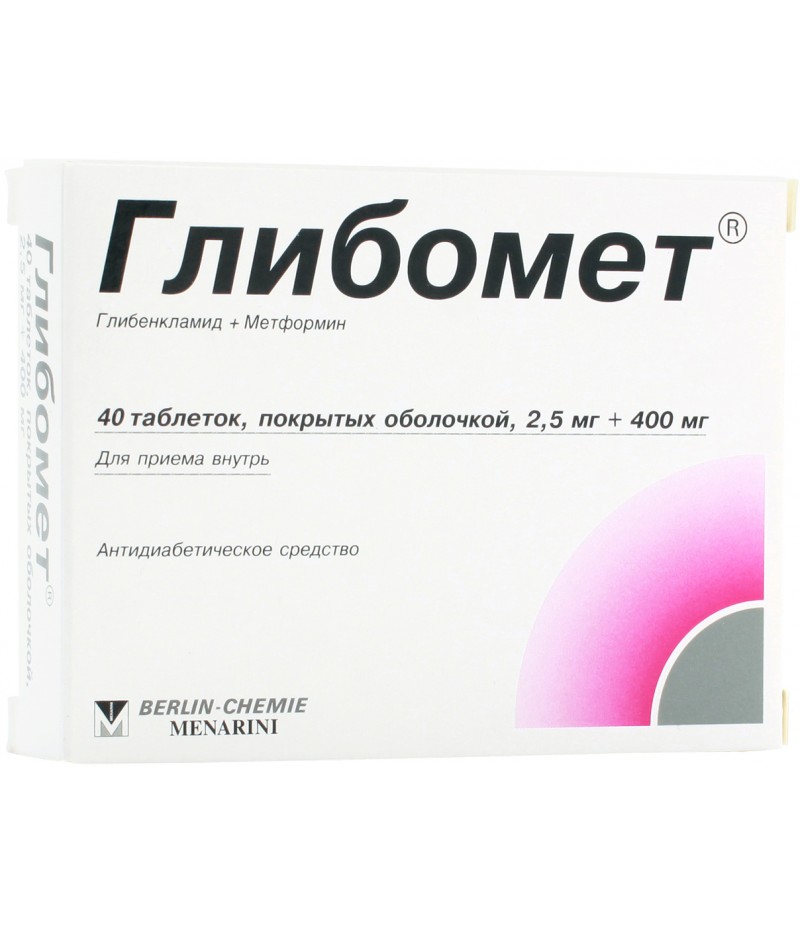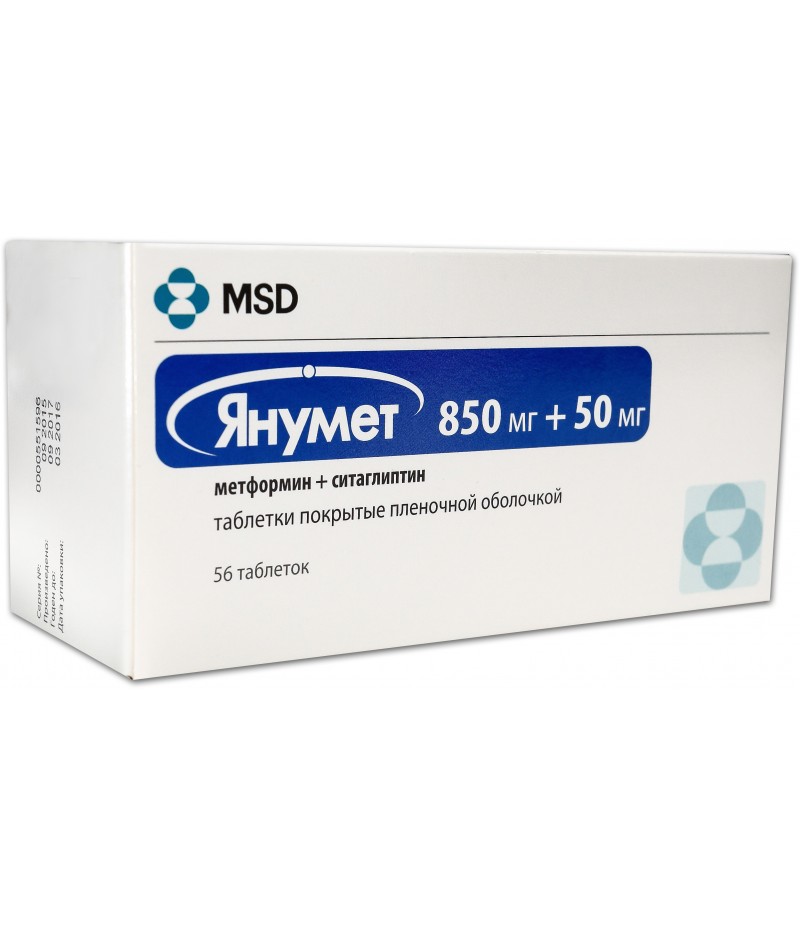Glibomet 2.5mg + 400mg #40
- $18.35
- 3 or more $17.50
- Availability:In Stock
Glibomet user manualYou can buy Glibomet online hereComposition1 tablet contains 2.5 mg of Glibomet and 400 mg of metformin hydrochloride - the active ingredients.Additional Ingredients: 57.5 mg corn starch; ..
Tags: tabs
Glibomet user manual
You can buy Glibomet online here
Composition
1 tablet contains 2.5 mg of Glibomet and 400 mg of metformin hydrochloride - the active ingredients.
Additional Ingredients:
57.5 mg corn starch;
65.0 mg of microcrystalline cellulose;
20.0 mg of colloidal silicon dioxide;
17.5 mg - glycerol (glycerol);
40.0 mg is gelatin;
7.5 mg magnesium stearate;
15.0 mg is talc.
Sheath:
0.5 mg of diethyl phthalate;
2.0 mg - acetylphthalyl cellulose;
2.5 mg is talc.
Form of issue
The drug Glibomet is available in the form of tablets in a shell, 40; 60 or 100 pieces in one package.
pharmachologic effect
Hypoglycemic, hypolipidemic.
Pharmacodynamics and pharmacokinetics
Glibomet is a combined oral (for internal administration) hypoglycemic drug, derivatives of bithuanide and sulfonylurea of the second generation, which manifests an extra-pancreatic and pancreatic action.
The sulfonylurea derivative of the second generation, Glibomet, has a stimulating effect on the secretion of insulin, by lowering the irritating threshold of beta cells of the pancreas with glucose.
Glibomet enhances susceptibility to insulin and the strength of its binding to target cells, increases the release of insulin, increases its effect on the process of glucose uptake by the liver and muscles, and inhibits lipolysis in adipose tissue. The effect of the drug is manifested in the second stage of insulin production.
The biguanide derivative, metformin, has a stimulating effect on the peripheral sensitivity of tissues to insulin effects (enhances the receptor bond of insulin and increases its effects at the post-receptor level).
In the intestine reduces the absorption of glucose, inhibits gluconeogenesis and favorably affects lipid metabolism, contributes to the reduction of excess weight in patients with diabetes mellitus. Has fibrinolytic efficacy due to inhibition of the inhibitor of the tissue plasminogen activator.
Hypoglycemic action of Glibomet develops after 2 hours and is observed for 12 hours.
A synergistic combination of the two active ingredients of the drug - the stimulating effect of the sulfonylurea derivative on the production of its own insulin (pancreatic action) and the direct effect of biguanide on fat and muscle tissue (extra-pancreatic action - a significant increase in glucose uptake) and liver tissue (a decrease in gluconeogenesis), allows for a certain proportion of doses reduce the content of each element.
This circumstance helps to avoid excessive activation of beta-cells in the pancreas, and thus to reduce the risk of disruption of its functionality, as well as to increase the safety of hypoglycemic agents and reduce the incidence of possible side effects.
Absorption of Glibomet in the gastrointestinal tract occurs quickly and at a sufficiently high level (84%). The maximum concentration is observed after 1-2 hours. Relationship with plasma proteins at 97%. It is practically completely metabolized (to inactive metabolites) in the liver. It is excreted in bile and urine in a proportion of 50/50%, with a half-life of 5 to 10 hours.
Absorption in the gastrointestinal tract metformin is also quite complete. The drug almost does not bind to plasma proteins and quickly spreads into tissues. In the body it is not metabolized. It is excreted mostly by the kidneys and in a small amount by the intestine, with a half-life of about 7 hours.
Indications for use
The drug Glybomet is indicated for the treatment of type 2 diabetes mellitus, in case of ineffectiveness of diet therapy and previous treatment with biguanides and sulfonylurea derivatives, as well as other hypoglycemic oral medications.
Contraindications
hypersensitivity to Glibomet (including derivatives of sulfonylureas), metformin or other ingredients of the drug;
gestational diabetes;
type 1 diabetes mellitus;
lactoacidosis (including in the anamnesis);
precoma, ketoacidosis, coma (diabetic);
Conditions that are characterized by a violation of the absorption of food and the formation of hypoglycemia;
acute conditions with a risk of renal dysfunction: severe infections, dehydration, shock, the introduction of contrasting iodine-containing substances (intravascular);
impaired hepatic function;
pathology of the kidneys (with creatinine for men over 135 mmol / l and for women more than 110 mmol / l);
conditions associated with hypoxia (respiratory or heart failure, shock, previous myocardial infarction, severe painful conditions of the respiratory tract);
gangrene, infectious diseases, extensive surgical interventions, acute large blood loss, trauma, extensive burns and other conditions that require insulin therapy;
a period of 48 hours before and after surgery, or performing X-ray or radioisotope testing with the introduction of a contrast iodine-containing substance;
leukopenia;
dystrophic changes (lipodystrophy, myotonic dystrophy);
porphyria;
maintenance of a hypocaloric diet (up to 1000 kcal per day);
acute intoxication with alcohol, chronic alcoholism;
insufficiency of glucose-6-phosphodiesterase;
age up to 18 years;
pregnancy and breastfeeding.
Do not recommend taking Glibomet in patients over 60 years of age who are engaged in heavy physical work, due to the increased risk of lactic acidosis.
Carefully:
heavy physical exertion (risk of lactic acidosis);
pathologies of the thyroid gland;
febrile syndrome;
hypofunction of the adrenal cortex and / or anterior lobe of the pituitary gland.
Side effects
CNS:
headache.
The digestive system:
appetite disorders;
nausea;
soreness in the abdomen;
vomiting;
the taste of metal in the mouth;
diarrhea;
activation of liver enzymes.
The system of hematopoiesis:
hemolytic anemia;
leukopenia;
erythrocytopenia;
thrombocytopenia;
megaloblastic anemia;
agranulocytosis;
pancytopenia.
Skin:
erythema;
hives;
photosensitization;
itching.
Metabolism:
hypoglycemia;
lactic acidosis.
If signs of lactic acidosis (general weakness, abdominal pain, vomiting, muscle cramps) are detected, stop taking Glibomet tablets immediately and consult a doctor.
Others:
disulfiram-like reaction, is manifested when drinking alcohol and is characterized by reddening of the upper body and facial skin, headache, palpitation, nausea and vomiting, increased blood pressure.
Glibomet tablets, instructions for use
Instructions for use Glibomet recommends taking the medication tablets orally (orally), preferably during meals.
Dosage and duration of therapy are selected by the attending physician, based on the state of carbohydrate metabolism of the patient and blood glucose content.
Typically, the initial daily dose is equal to 1-3 tablets, followed by a gradual adjustment to select the most effective dosage, which will ensure a stable normalization of blood glucose.
The maximum allowable daily dosage is 6 tablets.
Overdose
In overdose, the development of hypoglycemia (Glibomet) and lactic acidosis (metformin) was noted.
When hypoglycemia was observed: hunger, weakness, increased sweating, neurological disorders (temporary nature), palpitation, paresthesia in the oral cavity, pale skin, tremor, headaches, anxiety, pathological drowsiness, fear, sleep disorders, coordination disorders. With the progression of this condition, loss of self-control and consciousness was noted.
In the case of hypoglycemia of the lung, sugar, drinks or food containing a large amount of carbohydrates (honey, jam, sweet tea) are recommended. If hypoglycemia is accompanied by a loss of consciousness, IV / 40 injected a 40% solution of dextrose (glucose) in a volume of 40-80 ml, followed by an infusion of 5-10% dextrose solution. In the future, additional administration of 1 mg of glucagon is possible.
If the patient remains unconscious, the above procedures are repeated. The lack of effect in this case, gives rise to intensive therapy.
When laktatsidoza noted: severe weakness, respiratory disorders, muscle pain, drowsiness, nausea, abdominal pain, vomiting, reflex bradyarrhythmia, diarrhea, lowering blood pressure, hypothermia, confusion and loss of consciousness.
In case of suspicion of lactic acidosis, it is necessary immediately to cancel the drug, to hospitalize the patient and to conduct a hemodialysis procedure.
Interaction
Hypoglycemic effects of Glibomet are enhanced when combined with coumarin derivatives (Cincumar, Warfarin), beta-adrenoblockers, salicylates, oxytetracycline, cimetidine, allopurinol, sulfonamides, MAO inhibitors, probenecid, phenylbutazone and its derivatives, chloramphenicol, sulfonamide, cyclophosphamide, perhexylline, miconazole oral), Phenyramidol, Sulfinpyrazone and ethanol.
Glucocorticoids, adrenaline, oral contraceptives, barbiturates, thiazide diuretics and thyroid hormones reduce the hypoglycemic effectiveness of Glibomet.
Against the background of taking Glibomet, it is possible to enhance the effects of anticoagulants.
Concurrent administration of cimetidine may increase the risk of lactic acidosis.
Beta-adrenoblockers can mask manifestations of hypoglycemia (the exception is increased sweating).
The use of radiopaque iodine-containing drugs (for intravascular administration) can lead to impaired renal function and cumulation of metformin (risk of lactic acidosis).
Storage conditions
Storage temperature - up to 30 ° С.
Shelf life - 36 months.
special instructions
During the therapy, patients must strictly follow all the doctor's recommendations regarding dosage and method of application of the drug, exercise regimen, compliance with diet and self-monitoring of blood glucose levels.
Lactacidosis is a dangerous, but fortunately, a rare pathological condition that manifests itself by the accumulation of lactic acid in the blood, due to the accumulation of metformin. The observed cases of lactic acidosis in patients taking Metformin were most often observed in patients with diabetes mellitus with concurrent pronounced renal and heart failure.
In order to prevent possible lactic acidosis, it is necessary to identify all associated risk factors, such as: ketosis, decompensated diabetes, prolonged fasting, liver failure, aggravation with alcoholic beverages and any condition leading to hypoxia.
When Glibomet therapy is under way, the amount of serum creatinine should be monitored at least once every 12 months with normal kidney function and at least 2-4 times at 12 months old and with creatinine close to HHV.
Special care should be taken in cases of a risk of impaired renal function (initiation of NSAID treatment, antihypertensive drugs, diuretics).
Therapy with Glibomet should be discontinued 48 hours prior to X-ray testing with intravenous administration of contrasting iodine-containing substances (during this time, other hypoglycemic drugs should be taken).
Also, interruption of therapy within 48 hours requires a routine surgical intervention under anesthesia, with epidural or spinal anesthesia.
The resumption of treatment is possible after the patient has switched to oral nutrition or 48 hours after the operation, provided the kidneys function normally.
Care should be taken when driving vehicles or performing accurate and dangerous work.
Analogues of Glybomet
Children
The use of Glibomet is contraindicated up to 18 years.
With alcohol
Ethanol, like alcoholic beverages, can provoke hypoglycemia, and also cause a disulfiram-like reaction (abdominal pain, dizziness, nausea, a sensation of fever in the upper body and skin of the face, vomiting, tachycardia, headaches), and therefore refuse to drink alcohol in all kinds.
In pregnancy and lactation
The intake of Glibomet is contraindicated in the period of breastfeeding and pregnancy.
Reviews about Glybomet
Among the patients currently taking this medication, reviews of Glibomet are mostly positive, although with some references to various, often inessential, side effects.
Many people with type 2 diabetes mellitus take Glibomet tablets in combination with other hypoglycemic agents and therefore can not confirm with certainty the effectiveness of this particular drug.
Other patients, who in the past were appointed Glibomet, were dissatisfied with its effects and eventually switched to other drugs of similar effect. All this suggests that the treatment of diabetes should be approached strictly individually, and there is no guarantee that the same drug will be equally suitable for all patients.
Another problem of combined medicines is a fixed mass content of active ingredients, which is not always suitable for each patient.
It can be concluded that in the case when Glybomet is suitable for the patient in all parameters, its effectiveness will remain at a rather high level, as well as vice versa, in case of an unsatisfactory response to the ingredients of the drug, it is better to switch to another drug.
It is worth recalling that when diabetes is prescribed treatment, dosage adjustments and drug regimens can be adjusted only by a doctor.


